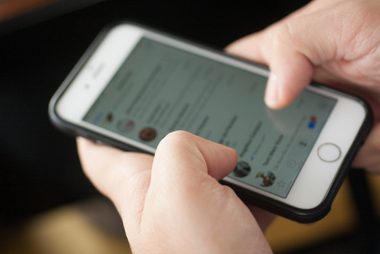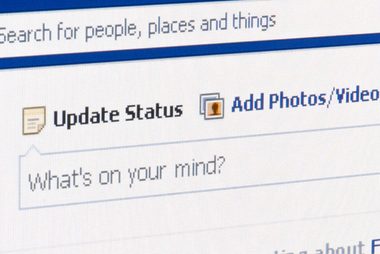
Posting mundane pictures
Feeling the need to post a picture of something as mundane as a warm mug of coffee must mean you’re too hooked on social media, right? Not necessarily, says Pamela Rutledge, PhD, director of the Media Psychology Research Center. Documenting that moment means you’re taking the time to be grateful of those small joys. “It might seem empty and vacuous to someone looking at it, but when you see that cup of coffee, you’re reminded of that morning, that cup of coffee, that feeling,” says Dr. Rutledge. “Things that seem superficial are things that make us appreciative of the small moments. It’s not about the big moments—it’s about what we do every day.” Instead of pining over glamorous vacation pictures, you’ll appreciate routine with those everyday snapshots. Beware of these photos you should never post on social media.

Checking social media at work
Taking breaks throughout the day is important for refreshing your mind and boosting productivity. There’s no reason not to take a quick Facebook break when your mind needs a rest. “If you say, ‘this is relaxation,’ you don’t have to feel guilty,” says Dr. Rutledge. “It’s like a coffee break.” The key is not to get too sucked in, she says. Set a timer to make sure a brief distraction doesn’t turn into full-fledged procrastination. Don’t miss these other ways to have a healthy relationship with social media.

Pulling up Facebook at every empty moment
Maybe you’ve heard the argument that we can’t handle being alone with our thoughts anymore because our screens are so distracting. But that doesn’t mean you have to feel guilty about pulling your phone out to kill time. After all, checking out Instagram is no worse than picking up a celebrity gossip magazine while you’re waiting in line, says Dr. Rutledge. “Is having quiet time to be able to think and be thoughtful is important? Absolutely,” she says. “But rarely do people just sit there and meditate or do any of those positive things people are supposed to be doing [in line].”

Taking tons of selfies
If pictures are worth a thousand words, sending temporary pictures via Snapchat has changed communication. When phones started getting front-facing cameras, it became easier than ever to take a selfie framed just how you want it. Capturing your face in a photo adds human interest to your vacation pictures, and everyday selfies can give friends context to your routine life, says Dr. Rutledge. We’ve been taught that self-promotion is the same as bragging, but selfie-takers aren’t always seeking attention. Sometimes, sending a Snapchat selfie just shows your emotions better and quicker than typing, she says. “Anything really out of balance where you’re relying too much on other people’s approval—that’s a problem,” says Rutledge. “That’s not most of what happens on social media though.”

Pulling up Facebook when hanging out in person
Don’t get so sucked into social media that you ignore everyone around you, but pulling your phone out can be appropriate in some social settings. As long as no one overdoes it, scrolling through posts can even turn into conversation-starters in a group. “It’s not like they’re all sitting there connecting with networks beyond where they are,” says Dr. Rutledge. “They lean over and show it to somebody.” If you do feel like your guests are just staring at screens without talking, though, suggest an activity to pull them away, she says. Starting a game or asking for a hand in the kitchen will bring them back to the real world without making it seem like a punishment for using their phones.

Deleting friends
Stop feeling guilty about deleting someone as a friend or unfollowing a person on social media. If someone’s posts tend to make you angry or jealous, just quietly stop following that feed. “We’re not used to thinking about having that level of control,” says Dr. Rutledge. But just like you wouldn’t hang out with people who make you feel bad, you shouldn’t feel stuck with negative posts on social media, she says.

Turning into a crazy cat video lady
Good news: Funny cat videos aren’t a waste of time. Smiling and laughing (even if kitty antics aren’t exactly high-brow) get rid of grouchy feelings that could tempt you into snapping at other people. “Happy people attract happy people, and it becomes sticky,” says Dr. Rutledge. Plus, if you share that cat video or a funny meme, you spread that positivity even more, she says.

Venting online
Complaining on a public site isn’t necessarily a bad thing. But on Facebook—which people use for sharing big news and entertaining tidbits—your friends might get sick of constant gripes. If you need a space to vent online, a platform like Tumblr or Median might be better, says Dr. Rutledge. “There are lots of ways with social media to have personal expression, so you have to find the one that fits both the content and audience,” she says. Use these etiquette rules for complaining on social media. Before you set up an account, do some soul-searching to figure out what’s driving your need to post, she says. If you just want to get something off your chest, that public forum or a paper journal might be a good choice. But if you’re looking for people to acknowledge your pain, reach out to a friend for a deeper discussion.